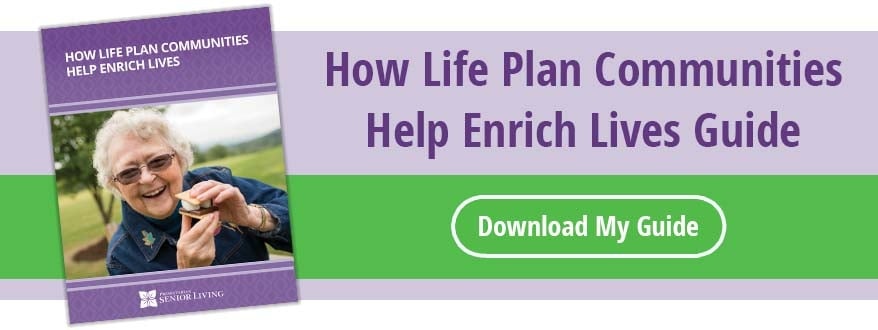
Celebrating Memories: 5 Steps for Documenting Family Stories
Health & Aging | Miscellaneous
Sharing a lifetime of memories is a powerful way to connect with family and friends and to ensure that the legacy of our unique experiences lives on. At Presbyterian Senior Living, we believe in celebrating the rich tapestry of our residents’ lives. Writing and sharing family stories is an excellent way to do just that.
Why document family stories?
Writing down personal experiences requires commitment. It takes time and a willingness to delve into sometimes difficult memories. But writing personal stories preserves a unique legacy for future generations, ensuring that your experiences, wisdom, and insights are passed on. It also provides a therapeutic outlet for reflection, helping individuals achieve clarity, closure, and a deeper understanding of their life journey.
Every life is a unique story, and by writing down your memories and experiences, you can create a lasting legacy for your family and descendants. Your stories can provide insight into the history, values, and traditions that have shaped your family.
Your family stories also can bridge the generation gap, helping younger family members understand and appreciate the history, struggles, and triumphs of their elders. They can foster a sense of unity and connection within the family.
5 steps to begin documenting
1. Gather your materials
Start by gathering photos, letters, and any other mementos that can help jog your memory. These items can be excellent prompts for remembering specific events and people.
2. Create a timeline
Organize your memories chronologically to help structure your storytelling. Begin with your earliest memories and progress through your life’s milestones. Consider how your personal stories tie into the greater historical context. You have lived through significant historic events, and your personal accounts provide valuable insights into the past. Whether they are stories from World War II, the civil rights movement, or other major events, your memories can contribute to a broader understanding of history.
3. Write freely

Don’t worry about grammar, punctuation, or perfect prose in your initial drafts. What’s most important is to capture your memories and stories. You can refine and edit later. If writing is a struggle for you, consider setting up a video camera on a tripod or using an audio recorder to document stories orally. This allows family members to hear your voice as you share your memories, and video lets them see your expressions as you page through your experiences.
4. Share personal anecdotes
Include anecdotes and stories that provide a glimpse into your daily life, family traditions, and significant events. Sharing the big and small moments, the happy and the sad can make your stories more relatable.
5. Reflect on life lessons
Share the wisdom you’ve gained from your experiences. These insights can be particularly valuable to your family. Sharing your wealth of knowledge and lessons learned over the years can offer guidance and inspiration to younger generations, helping them to navigate their journeys.
Share your stories

Documenting your stories is only the first step in celebrating memories. Once you’ve finished writing or recording audio or video, it’s time to share your experiences and insights.
One creative way to do this is by assembling a family book. Compile your stories into book or scrapbook form, complete with photos and mementos. You can distribute physical copies to family members or create digital versions to share online.
Another option is to gather your family for storytelling sessions where you can share your memories in person. These intimate gatherings can be deeply meaningful and allow for open dialogue.
If you’d like to share your stories with a broader audience, create a blog or social media account. This can be an excellent way to connect with extended family, friends, and others interested in your experiences. You also can become part of an oral history project. Many organizations and libraries sponsor such projects to document personal stories and experiences. Taking part can help preserve your stories for a wider audience.
Seniors have a unique opportunity to celebrate their memories and leave a lasting legacy for family members and future generations. By documenting and sharing family stories, you can create connections, pass on wisdom, and ensure that your experiences are never forgotten. At Presbyterian Senior Living, we encourage residents to embrace the power of storytelling as a way to enrich their lives and the lives of their loved ones.
About Presbyterian Senior Living
As the trusted leader in aging services, Presbyterian Senior Living combines over 95 years of experience with innovative approaches to senior communities and services. Across our 27 communities in PA, MD, OH, and DE, we serve over 6,500 seniors. We are committed to: FOSTERING teamwork and responsibility. UPHOLDING integrity in every action. EMBRACING innovation to create opportunities for everyone’s success. LEADING with compassion and respect.


